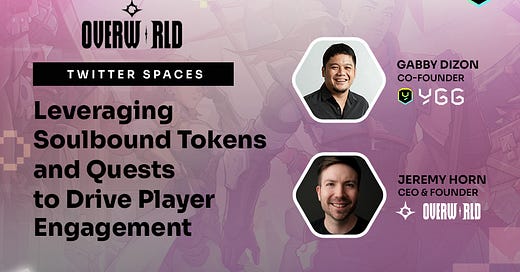OVERWORLD Twitter Spaces: Leveraging Soulbound Tokens and Quests to Drive Player Engagement
Gabby joins Overworld's founder and CEO, Jeremy Horn, in a Twitter Space to discuss how YGG drives growth and engagement by directing players to games that align with their activities in web3.
Overworld is a cross-platform gaming developer building competitive and social free-to-play games set in amazing worlds. With a vision to connect millions of people across the globe through digital ownership, they are focused on developing web3-native universes that will be expanded across various media and platforms. Founded by industry veterans from companies like Riot and Ubisoft, with renowned free-to-play game maker Jeremy Horn at the helm, Overworld aims to bridge the gap between web2 and web3 gaming and deliver exceptional experiences that seamlessly blend fun and ownership.
Hosted by Overworld, “MAKERS x MAKERS” is a regular Twitter Spaces show featuring the builders of some of the most exciting web3 games and projects today. In this session, Gabby Dizon joined Jeremy to discuss how the guild promotes community-based user acquisition, the Guild Badge, YGG’s global network of guild partners, the Guild Advancement Program, and Gabby’s takes for the year ahead and beyond.
The following is an excerpt from the Twitter Space where Jeremy and Gabby discuss the use of soulbound tokens and quests as a means to target and attract players to web3 games. Listen to the full recording on Twitter.
🎙️MAKERS ❌ MAKERS ft. Yield Guild Games
Jeremy (18:01): Being on the buyer side, there's definitely a lack in the current model. It's very difficult to target users. The entire free-to-play model is about identifying the right players, the ones that resonate with your brand and gameplay.
Currently, in web3, there is no solid data set. It's been a challenge because there are no alternatives for access to valuable data, which is one of the reasons why Twitter is so popular. I don't think Twitter is the best place for web3, but it's the only option for valuable data. The only data we have is Twitter posts and how users interact with other accounts.
Facebook, despite concerns, allowed early targeting of the right people. By having wonderful targeting, you can provide great experiences to people instead of a random approach to marketing. You can look at the right place for your game. So, from a buyer's perspective, how can I use soulbound tokens to approach potential RPG or competitive players? What can I do to incentivize them to try our game?
Gabby (19:45): An interesting thing in web3 is that you can check someone's wallet to see their transaction history, assets in different games, and achievements through soulbound tokens.
We have a program in our Discord called the Guild Advancement Program, which runs every three months. It gives people achievements in the games we work with, like My Pet Hooligan, Axie, The Sandbox, and others. This provides more information about their gaming preferences and accomplishments.
For example, if we partner with a game and someone has a YGG Badge, we can see their achievements and if they've played similar games in the same genre. Then we can design offers or quests for them. Quests and offers are essentially the same thing.
We collaborate closely with games to create quests for people to try out and get rewards. We're pioneering this with our community and aim to scale it further this year.
Jeremy (21:29): Just hearing about it gives me new ideas on how to implement such a system. Hopefully, you understand how I would leverage that data to target the right players.
Normally, free-to-play games have a challenge in getting players to enjoy the game because there are so many options and limited time. But because you're creating a real, valuable incentive within the game, you're actually getting a better shot at players enjoying the game, right?
Unless a game is recommended by a friend or the market, I tend not to try new ones. However, if there was an incentive, like completing a 20-minute quest to earn a soulbound NFT, it would make a difference. Even if I don't like the game, I wouldn't feel like my time was wasted.
As a developer, I can use that 20-minute period to convince the player that the game is fun and encourage them to come back for more experiences. I find this super interesting and it's not something I had thought of before.
Gabby (23:06): If you think about mobile app install ads on Facebook, the goal was to get people to install and play the game, which eventually leads to in-game spending. However, there was a strange incentive where the creative ads were often different from the actual game. This distorted the incentives and user acquisition. But with quests in the game, people can try the game experience before deciding if they like it and want to continue.
You can listen to the full recording on the Overworld Twitter.
Follow Gabby and Jeremy to learn more about web3 gaming.
Join the YGG Discord or follow us on Twitter for future updates.




